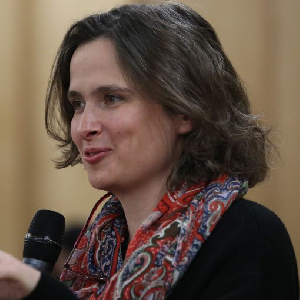PROFIL PRACOWNIKA: Magdalena Saryusz-Wolska

prof. dr hab. Magdalena Saryusz-Wolska
SCIENTIFIC AND SOCIAL MEDIA PROFILES
POSITION DESCRIPTION
BIOGRAPHICAL NOTE
Born in 1980, Magdalena Saryusz-Wolska studied cultural studies and sociology at the Universities in Lodz, Giessen and Mainz. She received her Ph.D. from the University of Lodz in 2008 and completed her habilitation at the University of Warsaw in 2016. Since 2008, she has been an assistant professor at the Institute of Contemporary Culture at the University of Lodz. She held a research fellowship at the Centre for Historical Research of the Polish Academy of Sciences in Berlin from 2010 to 2015, after which she became a research fellow at the German Historical Institute Warsaw. From 2018 to 2020, she was also a visiting professor and Humboldt Research Fellow at the Johannes Gutenberg Universität-Mainz. She is the ambassador scientist of the Alexander von Humboldt Foundation in Poland.
INTERESTS
Film and media history since 1945, visual history, collective and cultural memory, reception studies.
ACHIEVEMENTS
Selected publications
Entrepreneurs of Memory. Selling History in the GDR Museum Shop in Berlin, "Memory Studies" 2024 (online first) (jointly with Sabine Stach and Hanno Hochmuth, forthcomming)
The Montage of the National Past: Polish Right-Wing Illustrated Press and the Abuse of History. In: Naviseh Mousavi, Beate Schirrmacher (eds), Truth Claims across Media. New York: Palgrave 2023 (forthcoming)
Microhistories of Memory. Remediating the Holocaust by Bullets in Postwar West Germany. New York and Oxford: Berghahn Books 2023,https://www.berghahnbooks.com/title/SaryuszWolskaM...
Mikrogeschichten der Erinnerungskultur. "Am grünen Strand der Spree" und die Remedialisierung des Holocaust. Berlin and Boston: De Gruyter York 2022, open access: https://doi.org/10.1515/9783110745528
The German ‘Floating Gap‘: Post-Unification Memory in Literary Fiction. In: Veronika Pehe, Joanna Wawrzyniak (eds.), Remembering the Neoliberal Turn. Economic Change and Collective Memory in Eastern Europe after 1989. London et al: Routledge 2024 (jointly with Joanna Jabłkowska)
New constellations of mnemonic wars: an introduction. In: Memory Studies 15 (6), 2022, 1275–1288, open access: https://doi.org/10.1177/17506980221133733 (jointly with Joanna Wawrzyniak & Zofia Wóycicka)
Traveling Memories of the Holocaust in the Occupied Soviet Union: Hans Scholz’s “Through the Night” and its Remediations, in: German Studies Review (2020), vol. 43 (3), https://doi.org/10.1353/gsr.2020.0079.
Abusing public visual history. The current right-wing press in Poland. In: The Public Historian (2020), vol. 42 (3) https://doi.org/10.1525/tph.2020.42.3.61.
Historia wizualna. Obrazy w dyskusjach niemieckich historyków, ed. Magdalena Saryusz-Wolska, Warszawa: WN Scholar 2020 ( = Klio w Niemczech, vol. 25).
Przeszłość i przyszłość badań pamięci. Czy potrzebujemy nowej dyscypliny? In: Politeja (2020), vol. 65 (2) https://doi.org/10.12797/Politeja.17.2020.65.01.
„Product Not Available in Pre-War Quantities – but Quality Remains the Same”. Remarks on Advertisements as Historical Source, trans. Patrick Trompiz. In: View. Theories and Practices of Visual Culture (2019) 25, https://www.pismowidok.org/en/archive/2019/25-present-history/notes-on-advertising.
Holocaustdarstellungen im polnischen Film. Drei Beispielstudien. In: Helmut Peitsch, Christoph Kapp et al. (eds.): Nachkriegsliteratur als öffentliche Erinnerung. Deutsche Vergangenheit im Europäischen Kontext. Berlin and New York: De Gruyter 2018.
Verordnete Geschichte. Nationalistische Narrative in Polen. In: Osteuropa 2-5 (2018) (jointly with Sabine Stach and Katrin Stoll)
Bilder der Normalisierung. Gesundheit, Ernährung und Haushalt in der visuellen Kultur Deutschlands 1945-1948, Bielefeld: Transcript 2017 (jointly with Anna Labentz)
Ikony normalizacji. Kultury wizualne Niemiec 1945–1949. Warszawa: PWN 2015 (2. ed. 2017).
CONTACT DETAILS AND OFFICE HOURS
Pomorska 171/173 90-236 Łódź
